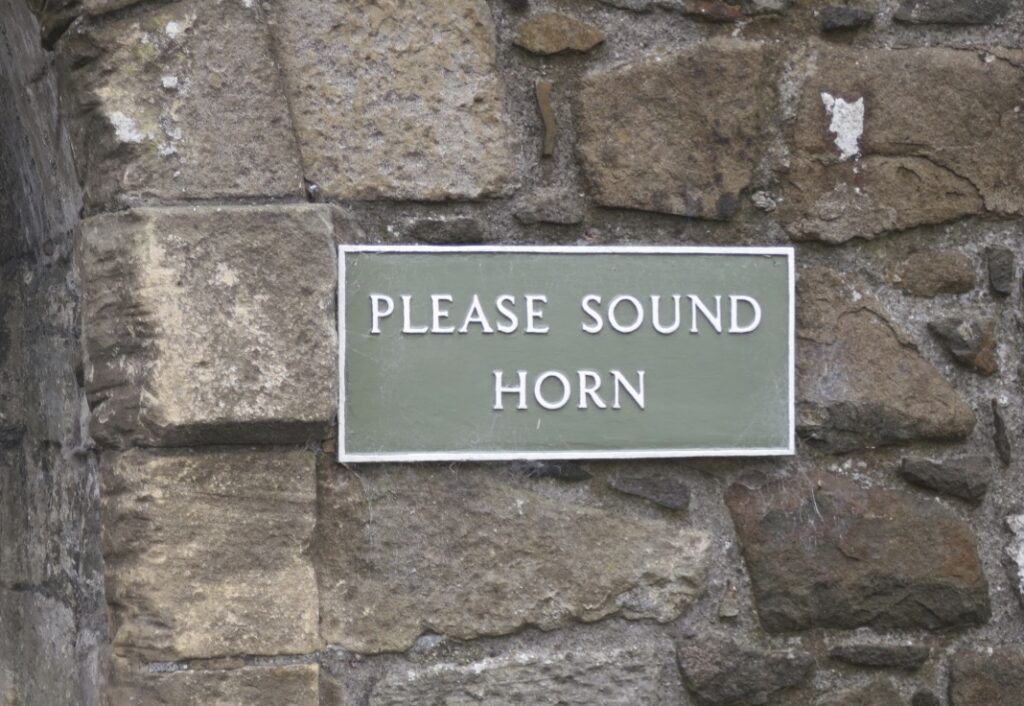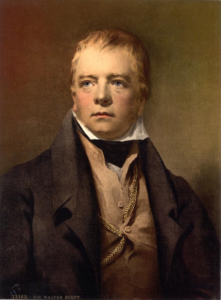Song of the imprisoned huntsman
(Poet's title: Lied des gefangenen Jägers)
Set by Schubert:
D 843
[April 1825]
Part of Sieben Gesänge aus Walter Scott’s Fräulein vom See
Mein Ross so müd in dem Stalle sich steht,
Mein Falk ist der Kapp’und der Stange so leid,
Mein müßiges Windspiel sein Futter verschmäht,
Und mich kränkt des Turmes Einsamkeit.
Ach wär ich nur, wo ich zuvor bin gewesen,
Die Hirschjagd wäre so recht mein Wesen,
Den Bluthund los, gespannt den Bogen,
Ja solchem Leben bin ich gewogen.
Ich hasse der Turmuhr schläfrigen Klang,
Ich mag nicht sehn, wie die Zeit verstreicht,
Wenn Zoll um Zoll die Mauer entlang
Der Sonnenstrahl so langsam schleicht.
Sonst pflegte die Lerche den Morgen zu bringen,
Die dunkle Dohle zur Ruh mich zu singen;
In dieses Schlosses Königshallen
Da kann kein Ort mir je gefallen.
Früh, wenn der Lerche Lied erschallt,
Sonn ich mich nicht in Ellens Blick,
Nicht folg ich dem flüchtigen Hirsch durch den Wald,
Und kehre, wenn Abend taut, zurück.
Nicht schallt mir ihr frohes Willkommen entgegen,
Nicht kann ich das Wild ihr zu Füßen mehr legen,
Nicht mehr wird der Abend uns selig entschweben,
Dahin, dahin ist Lieben und Leben.
My horse is so weary of standing in his stall,
My hawk is so tired of the hood and perch,
My idle greyhound is off his food,
And the solitude of this tower is making me ill.
Oh if only I were now where I used to be,
Hunting deer would be just right for my nature,
With the bloodhound free, the bow drawn:
Yes, such is the life that is suitable for me.
I hate the drowsy sound of the tower clock,
I cannot bear to see how time is passing,
When inch by inch across the wall
The sunbeam creeps so slowly.
At one time the lark used to bring in the morning,
The dark jackdaw used to sing me to sleep;
In the royal halls of this castle,
There is no spot that can please me.
Early in the morning, when the lark’s song rings out,
I do not sun myself in Ellen’s eyes,
I do not follow the fleeing deer through the forest,
And I do not return when dew falls in the evening;
Her cheerful welcome does not ring out for me,
I can no longer lay the game at her feet,
No longer is evening going to float by blissfully for us:
Love and life are over, over!
All translations into English that appear on this website, unless otherwise stated, are by Malcolm Wren. You are free to use them on condition that you acknowledge Malcolm Wren as the translator and schubertsong.uk as the source. Unless otherwise stated, the comments and essays that appear after the texts and translations are by Malcolm Wren and are © Copyright.
☙
Themes and images in this text:
Being solitary, alone and lonely Bows and arrows Clocks Deer Dogs Evening and the setting sun Horses Hunters and hunting Larks Prisons and dungeons Riding – on horseback
Like ‘Ave Maria’ (Ellen’s third song, Schubert’s D 839) this is a song that is overheard in Scott’s long narrative, The Lady of the Lake. The final Canto of the story is set in Stirling Castle, and it tells how Ellen Douglas goes there to appeal to the King of Scotland for the lives of her father and her fiancé, Malcolm Graeme. She has been given a ring that guarantees her an audience with King James, and while she is waiting for him she is asked to wait in a grand chamber in the castle:
XXIII.
Ellen the while, with bursting heart,
Remained in lordly bower apart,
Where played, with many-coloured gleams,
Through storied pane the rising beams.
In vain on gilded roof they fall,
And lightened up a tapestried wall,
And for her use a menial train
A rich collation spread in vain.
The banquet proud, the chamber gay,
Scarce drew one curious glance astray;
Or if she looked, 't was but to say,
With better omen dawned the day
In that lone isle, where waved on high
The dun-deer's hide for canopy;
Where oft her noble father shared
The simple meal her care prepared,
While Lufra, crouching by her side,
Her station claimed with jealous pride,
And Douglas, bent on woodland game,
Spoke of the chase to Malcolm Graeme,
Whose answer, oft at random made,
The wandering of his thoughts betrayed.
Those who such simple joys have known
Are taught to prize them when they 're gone.
But sudden, see, she lifts her head;
The window seeks with cautious tread.
What distant music has the power
To win her in this woful hour?
'T was from a turret that o'erhung
Her latticed bower, the strain was sung.
XXIV.
Lay of the Imprisoned Huntsman.
'My hawk is tired of perch and hood,
My idle greyhound loathes his food,
My horse is weary of his stall,
And I am sick of captive thrall.
I wish I were as I have been,
Hunting the hart in forest green,
With bended bow and bloodhound free,
For that's the life is meet for me.
I hate to learn the ebb of time
From yon dull steeple's drowsy chime,
Or mark it as the sunbeams crawl,
Inch after inch, along the wall.
The lark was wont my matins ring,
The sable rook my vespers sing;
These towers, although a king's they be,
Have not a hall of joy for me.
No more at dawning morn I rise,
And sun myself in Ellen's eyes,
Drive the fleet deer the forest through,
And homeward wend with evening dew;
A blithesome welcome blithely meet,
And lay my trophies at her feet,
While fled the eve on wing of glee,—
That life is lost to love and me!'
The voice is that of Malcolm Graeme, and his song ushers in the denouement of the complex story. The King is about to function as deus ex machina who will release Malcolm from prison and Ellen from her anxieties about her father and her lover.
Malcolm’s song reveals him to be a simple creature who is more at home in the glens of the highlands than in the royal castles of Stirling or Edinburgh. However, he is clearly aristocratic (he hunts with horses, dogs and falcons, not just with a bow and arrow). We learn from his song that he has a simple devotion to Ellen and we are therefore led to conclude that they are supposed to live happily ever after. Let us hope that she does not tire too quickly of having dead deer laid at her feet every evening.
☙

Scott’s original
“My hawk is tired of perch and hood,
My idle grey-hound loathes his food,
My horse is weary of his stall,
And I am sick of captive thrall.
I wish I were, as I have been,
Hunting the hart in forests green,
With bended bow and blood-hound free,
For that’s the life is meet for me.
“I hate to learn the ebb of time,
From yon dull steeple’s drowsy chime,
Or mark it as the sun-beams crawl,
Inch after inch, along the wall.
The lark was wont my matins ring,
The sable rook my vespers sing;
These towers, although a king’s they be,
Have not a hall of joy for me.
“No more at dawning morn I rise,
And sun myself in Ellen’s eyes,
Drive the fleet deer the forest through,
And homeward wend with evening dew;
A blithsome welcome blithely meet,
And lay my trophies at her feet,
While fled the eve on wings of glee, –
That life is lost to love and me!”
Storck’s German
Mein Roß so müd in dem Stalle sich steht,
Mein Falk ist der Kapp’ und der Stange so leid,
Mein müßiges Windspiel sein Futter verschmäht,
Und mich kränkt des Thurmes Einsamkeit.
Ach wär’ ich nur, wo ich zuvor bin gewesen,
Die Hirschjagd wäre so recht mein Wesen,
Den Bluthund los, gespannt den Bogen:
Ja solchem Leben bin ich gewogen.
Ich hasse der Thurmuhr schläfrigen Klang,
Ich mag nicht sehn, wie die Zeit verstreicht,
Wenn Zoll um Zoll die Mauer entlang
Der Sonnenstrahl so langsam schleicht.
Sonst pflegte die Lerche den Morgen zu bringen,
Die dunkle Dohle zur Ruh mich zu singen;
In dieses Schlosses Königshallen
Ist kein Ort, der mir kann gefallen.
Früh, wenn der Lerche Lied erschallt,
Sonn’ ich mich nicht in Ellens Blick,
Nicht folg’ ich dem flüchtigen Hirsch durch den Wald,
Und kehre, wenn Abend thaut, zurück;
Nicht schallt mir ihr frohes Willkommen entgegen,
Nicht kann ich das Wild ihr zu Füßen mehr legen,
Nicht mehr wird der Abend uns selig entschweben:
Dahin, dahin ist Lieben und Leben! –
Back translation
My horse is so weary of standing in his stall,
My hawk is so tired of the hood and perch,
My idle greyhound is off his food,
And the solitude of this tower is making me ill.
Oh if only I were now where I used to be,
Hunting deer would be just right for my nature,
With the bloodhound free, the bow drawn:
Yes, such is the life that is suitable for me.
I hate the drowsy sound of the tower clock,
I cannot bear to see how time is passing,
When inch by inch across the wall
The sunbeam creeps so slowly.
At one time the lark used to bring in the morning,
The dark jackdaw used to sing me to sleep;
In the royal halls of this castle,
There is no spot that can please me.
Early in the morning, when the lark’s song rings out,
I do not sun myself in Ellen’s eyes,
I do not follow the fleeing deer through the forest,
And I do not return when dew falls in the evening;
Her cheerful welcome does not ring out for me,
I can no longer lay the game at her feet,
No longer is evening going to float by blissfully for us:
Love and life are over, over!
Original Spelling and note on the text Lied des gefangenen Jägers Mein Roß so müd in dem Stalle sich steht, Mein Falk ist der Kapp' und der Stange so leid, Mein müßiges Windspiel sein Futter verschmäht, Und mich kränkt des Thurmes Einsamkeit. Ach wär' ich nur, wo ich zuvor bin gewesen, Die Hirschjagd wäre so recht mein Wesen, Den Bluthund los, gespannt den Bogen: Ja solchem Leben bin ich gewogen. Ich hasse der Thurmuhr schläfrigen Klang, Ich mag nicht sehn, wie die Zeit verstreicht, Wenn Zoll um Zoll die Mauer entlang Der Sonnenstrahl so langsam schleicht. Sonst pflegte die Lerche den Morgen zu bringen, Die dunkle Dohle zur Ruh mich zu singen; In dieses Schlosses Königshallen Da kann kein Ort mir je gefallen . Früh, wenn der Lerche Lied erschallt, Sonn' ich mich nicht in Ellens Blick, Nicht folg' ich dem flüchtigen Hirsch durch den Wald, Und kehre, wenn Abend thaut, zurück; Nicht schallt mir ihr frohes Willkommen entgegen, Nicht kann ich das Wild ihr zu Füßen mehr legen, Nicht mehr wird der Abend uns selig entschweben: Dahin, dahin ist Lieben und Leben! - 1 Schubert appears to have changed the word order of this line. Storck's original was 'Ist kein Ort, der mir kann gefallen'
Confirmed by Peter Rastl with Schubert’s source, Das Fräulein vom See. Ein Gedicht in sechs Gesängen von Walter Scott. Aus dem Englischen, und mit einer historischen Einleitung und Anmerkungen von D. Adam Storck, weiland Professor in Bremen. Zweite, vom Uebersetzer selbst noch verbesserte Auflage. Essen, bei G. D. Bädeker. 1823, pages 263-264; and with Das Fräulein vom See. Ein Gedicht in sechs Gesängen von Walter Scott. Aus dem Englischen, und mit einer historischen Einleitung und Anmerkungen von D. Adam Storck, Professor in Bremen. Essen, bei G. D. Bädeker. 1819, pages 285-286.
To see an early edition of the text, go to page 263 here: https://books.google.at/books?id=p0YRAQAAMAAJ
For the full text of The Lady of the Lake: https://www.gutenberg.org/files/3011/3011-h/3011-h.htm


